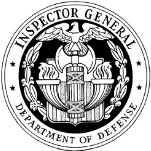The Department of Defense’s Inspector General (DoDIG) is appointed by the President or by the agency heads, who are themselves appointed by the President. The DoDIG is supposed to operate independently of the Department of Defense to prevent and detect fraud, waste, and abuse through audits and investigations. The DOD’s Inspector General is in charge of keeping the department head and the Congress informed about agency problems and deficiencies. The Inspector General is considered a watchdog for Congress concerning the performance within the DoD.
The Office of Inspector General is in charge of monitoring the activities of the internal audit, inspection, and investigating units of the military departments, with the goal of avoiding duplication and insuring effective coordination and cooperation.
The Inspector General Act of 1978 was the foundation of the office of inspector general and was created to look over the entire Department of Defense. The office was actually created by the 1983 DOD Authorization Act. The DoDIG is equivalent to other cabinet level inspector general offices and provides Congress with oversight of the uniformed Services and their respective inspector general systems.
The Office of Inspector General is organized into six main offices:
- Deputy Inspector General for Auditing - Duties are acquisitions and contract management, Defense Financial Auditing Service and operations support. Also performs the primary internal audit functions of the office of Inspector General within the Secretary of Defense, joint Chief of Staff, the United and Specified Commands, Military Departments and the Defense agencies. Audit coverage involves: allegations of fraud, waste and mismanagement, DoD hotline complaints, information in alleged violations of law, rule or regulations, information on alleged danger to public health and safety, matters involving economy and efficiency in DoD operations, contracts and programs, financial audits as well as cooperative projects within the DoD and governmental audit and inspection.
- Office of Communications and Congressional Liaisons - Duties are to keep the Congress and senior DoD personnel fully and currently informed of significant problems, innovative alternatives and the status of any improvement efforts associated with programs and operations of the department.
- Deputy Inspector General for Investigations - Includes the Defense Criminal Investigative Service, Military Reprisal Investigations and the Investigations of Senior Officials.
- Deputy Inspector General for Policy and Oversight - Provides oversight and policy for audit and investigative activities within DoD. This office conducts inspections and evaluations, provides technical, statistical, and quantitative advice and support for the Office of Inspector General. Their main goal is to provide oversight and policy support to the DoD and conduct assessments to Improve DoD programs and operations.
- Deputy Inspector General for Intelligence - Duties include: auditing, evaluation, monitoring and reviewing DoD programs, policies, procedures and functions of the intelligence community, as well as special access programs and nuclear security issues within the DoD.
- Office of Administration and Management - Their duties are to promote efficiency and productivity within the programs of DoD and to provide efficient, effective and courteous administrative support and services.
With whistleblower protection, military members now have the option of directly contacting their Military Inspector General or reporting their complaints to the DoDIG Director for military reprisal investigations through the defense hotline. The DoDIG website includes a link where
of mismanagement, fraud, waste and authority abuse can be made. DoDIG also has a defense hotline where complaints can made, (800) 424-9098 or an email complaint can be sent to
.
Inspector General Claude M. Kicklighter has refused to investigate Halliburton/KBR on gang-rape allegations made by former employee Jaime Leigh Jones. Jones reported that she had been gang-raped by her co-workers at Halliburton while working in Baghdad. Kicklighter, as well as other members of the Bush Administration, has reportedly been uncooperative throughout the investigation. Lawmakers, including Senator Hillary Clinton and Senator Bill Nelson, have been pushing the administration to reveal why an earlier investigation had not led to any prosecution. When Nelson asked Kicklighter to look into the matter, Kicklighter responded that “no further investigation by this agency into the allegations made by Jones is warranted.” Some suspect that the Inspector General has not taken the initiative to look into this case because of the possibility that Jones’ assault may not be an isolated case.
(by Justin Rood, ABC News)
Mick Kicklighter
(by John A. Byrne, Business Week)
After more than three years as Inspector General, Joseph Schmitz resigned in September 2005 to become chief operation officer and general counsel for the Prince Group, which owns the security contractor Blackwater Worldwide.
- Table of Contents
- Overview
- History
- What it Does
- Where Does the Money Go
- Controversies
- Suggested Reforms
- Comments
- Leave a comment

Glenn Fine, who previously served as Inspector General in the Department of Justice (DOJ), was appointed acting Inspector General for the Department of Defense in January, 2016, and was nominated by President Obama for the job on a permanent basis on September 28, 2016.
Fine, who was born in 1956, is from Melrose Park, Pennsylvania. His father, Morton, was an anti-trust attorney in the DOJ. The younger Fine attended Cheltenham High, where he played basketball. He continued to play while he attended Harvard, leading the Ivy League in assists.
Fine played so well, in fact, that after he graduated with a B.A. in economics in 1979, he had a choice. He could accept a Rhodes Scholarship to study at Oxford University, or he could join the San Antonio Spurs of the NBA, who had drafted Fine in the 10th round. Fine chose England over Texas and earned a B.A./M.A. in politics, philosophy and economics from Oxford’s Pembroke College. He then returned to Harvard, this time for a law degree in 1985.
Fine started his law career as an assistant U.S. Attorney in Washington in 1986. He left in 1989 for a spot as an associate at the Washington firm of Bredhoff & Kaiser, where he worked on labor and employment law.
Fine returned to the Justice Department in 1995 as special counsel to the Inspector General and director of special investigations and review.
In 2000, Fine was named Inspector General at the DOJ. Among his achievements there was his documentation of the George W. Bush administration firings of four U.S. Attorneys for partisan reasons and its packing of the Civil Rights Division with political appointees instead of civil service employees. His office also investigated the Federal Bureau of Investigation’s handling of Zacarias Moussaoui, who had enrolled in a flight school as part of the 9/11 terror plot. FBI headquarters had discouraged the office in Minneapolis, where Moussaoui was arrested, from getting a search warrant that might have turned up information that could have prevented the attacks. Fine’s office was highly critical of the bureau for not taking the threat posed by Moussaoui seriously.
Fine left the Justice Department in 2011 and both The New York Times and Washington Post wrote editorials at that time praising his work. He became a partner at the firm of Dechert LLP, where he focused on white collar crime and securities litigation. Fine returned to government service in June 2015, joining the Defense Department as principal Deputy Inspector General.
Fine is married to Beth Heifetz, also an attorney and a former law clerk to Supreme Court Justice Harry Blackmon. Fine and Heifetz have two daughters. Fine is a member of the Philadelphia Jewish Sports Hall of Fame.
-Steve Straehley
To Learn More
Justice and the I.G. (New York Times)
A Fine Job (Washington Post)

- Latest News
- D.C. Public Schools will Teach all Second-Graders to Ride a Bike
- New Rule in Germany Limits Sales of Sex-Themed E-Books to 10pm to 6am
- What Happened to the 6-Year-Old Tibetan Boy the Chinese Government Kidnapped 20 Years Ago?
- U.S. Ambassador to Turkey Photoshops his Hair Color to Mock Turkish Mayor
- Mystery Artist Calls Attention to Unfixed Potholes by Drawing Penises around Them
The Department of Defense’s Inspector General (DoDIG) is appointed by the President or by the agency heads, who are themselves appointed by the President. The DoDIG is supposed to operate independently of the Department of Defense to prevent and detect fraud, waste, and abuse through audits and investigations. The DOD’s Inspector General is in charge of keeping the department head and the Congress informed about agency problems and deficiencies. The Inspector General is considered a watchdog for Congress concerning the performance within the DoD.
The Office of Inspector General is in charge of monitoring the activities of the internal audit, inspection, and investigating units of the military departments, with the goal of avoiding duplication and insuring effective coordination and cooperation.
The Inspector General Act of 1978 was the foundation of the office of inspector general and was created to look over the entire Department of Defense. The office was actually created by the 1983 DOD Authorization Act. The DoDIG is equivalent to other cabinet level inspector general offices and provides Congress with oversight of the uniformed Services and their respective inspector general systems.
The Office of Inspector General is organized into six main offices:
- Deputy Inspector General for Auditing - Duties are acquisitions and contract management, Defense Financial Auditing Service and operations support. Also performs the primary internal audit functions of the office of Inspector General within the Secretary of Defense, joint Chief of Staff, the United and Specified Commands, Military Departments and the Defense agencies. Audit coverage involves: allegations of fraud, waste and mismanagement, DoD hotline complaints, information in alleged violations of law, rule or regulations, information on alleged danger to public health and safety, matters involving economy and efficiency in DoD operations, contracts and programs, financial audits as well as cooperative projects within the DoD and governmental audit and inspection.
- Office of Communications and Congressional Liaisons - Duties are to keep the Congress and senior DoD personnel fully and currently informed of significant problems, innovative alternatives and the status of any improvement efforts associated with programs and operations of the department.
- Deputy Inspector General for Investigations - Includes the Defense Criminal Investigative Service, Military Reprisal Investigations and the Investigations of Senior Officials.
- Deputy Inspector General for Policy and Oversight - Provides oversight and policy for audit and investigative activities within DoD. This office conducts inspections and evaluations, provides technical, statistical, and quantitative advice and support for the Office of Inspector General. Their main goal is to provide oversight and policy support to the DoD and conduct assessments to Improve DoD programs and operations.
- Deputy Inspector General for Intelligence - Duties include: auditing, evaluation, monitoring and reviewing DoD programs, policies, procedures and functions of the intelligence community, as well as special access programs and nuclear security issues within the DoD.
- Office of Administration and Management - Their duties are to promote efficiency and productivity within the programs of DoD and to provide efficient, effective and courteous administrative support and services.
With whistleblower protection, military members now have the option of directly contacting their Military Inspector General or reporting their complaints to the DoDIG Director for military reprisal investigations through the defense hotline. The DoDIG website includes a link where
of mismanagement, fraud, waste and authority abuse can be made. DoDIG also has a defense hotline where complaints can made, (800) 424-9098 or an email complaint can be sent to
.
Inspector General Claude M. Kicklighter has refused to investigate Halliburton/KBR on gang-rape allegations made by former employee Jaime Leigh Jones. Jones reported that she had been gang-raped by her co-workers at Halliburton while working in Baghdad. Kicklighter, as well as other members of the Bush Administration, has reportedly been uncooperative throughout the investigation. Lawmakers, including Senator Hillary Clinton and Senator Bill Nelson, have been pushing the administration to reveal why an earlier investigation had not led to any prosecution. When Nelson asked Kicklighter to look into the matter, Kicklighter responded that “no further investigation by this agency into the allegations made by Jones is warranted.” Some suspect that the Inspector General has not taken the initiative to look into this case because of the possibility that Jones’ assault may not be an isolated case.
(by Justin Rood, ABC News)
Mick Kicklighter
(by John A. Byrne, Business Week)
After more than three years as Inspector General, Joseph Schmitz resigned in September 2005 to become chief operation officer and general counsel for the Prince Group, which owns the security contractor Blackwater Worldwide.
Comments

Glenn Fine, who previously served as Inspector General in the Department of Justice (DOJ), was appointed acting Inspector General for the Department of Defense in January, 2016, and was nominated by President Obama for the job on a permanent basis on September 28, 2016.
Fine, who was born in 1956, is from Melrose Park, Pennsylvania. His father, Morton, was an anti-trust attorney in the DOJ. The younger Fine attended Cheltenham High, where he played basketball. He continued to play while he attended Harvard, leading the Ivy League in assists.
Fine played so well, in fact, that after he graduated with a B.A. in economics in 1979, he had a choice. He could accept a Rhodes Scholarship to study at Oxford University, or he could join the San Antonio Spurs of the NBA, who had drafted Fine in the 10th round. Fine chose England over Texas and earned a B.A./M.A. in politics, philosophy and economics from Oxford’s Pembroke College. He then returned to Harvard, this time for a law degree in 1985.
Fine started his law career as an assistant U.S. Attorney in Washington in 1986. He left in 1989 for a spot as an associate at the Washington firm of Bredhoff & Kaiser, where he worked on labor and employment law.
Fine returned to the Justice Department in 1995 as special counsel to the Inspector General and director of special investigations and review.
In 2000, Fine was named Inspector General at the DOJ. Among his achievements there was his documentation of the George W. Bush administration firings of four U.S. Attorneys for partisan reasons and its packing of the Civil Rights Division with political appointees instead of civil service employees. His office also investigated the Federal Bureau of Investigation’s handling of Zacarias Moussaoui, who had enrolled in a flight school as part of the 9/11 terror plot. FBI headquarters had discouraged the office in Minneapolis, where Moussaoui was arrested, from getting a search warrant that might have turned up information that could have prevented the attacks. Fine’s office was highly critical of the bureau for not taking the threat posed by Moussaoui seriously.
Fine left the Justice Department in 2011 and both The New York Times and Washington Post wrote editorials at that time praising his work. He became a partner at the firm of Dechert LLP, where he focused on white collar crime and securities litigation. Fine returned to government service in June 2015, joining the Defense Department as principal Deputy Inspector General.
Fine is married to Beth Heifetz, also an attorney and a former law clerk to Supreme Court Justice Harry Blackmon. Fine and Heifetz have two daughters. Fine is a member of the Philadelphia Jewish Sports Hall of Fame.
-Steve Straehley
To Learn More
Justice and the I.G. (New York Times)
A Fine Job (Washington Post)

- Latest News
- D.C. Public Schools will Teach all Second-Graders to Ride a Bike
- New Rule in Germany Limits Sales of Sex-Themed E-Books to 10pm to 6am
- What Happened to the 6-Year-Old Tibetan Boy the Chinese Government Kidnapped 20 Years Ago?
- U.S. Ambassador to Turkey Photoshops his Hair Color to Mock Turkish Mayor
- Mystery Artist Calls Attention to Unfixed Potholes by Drawing Penises around Them






Comments